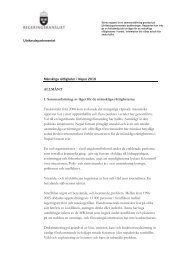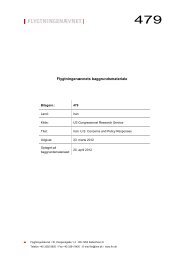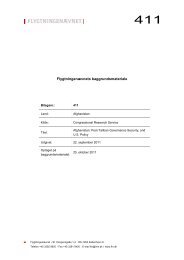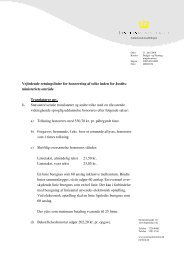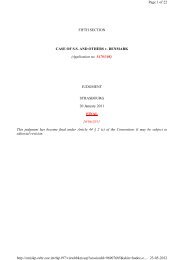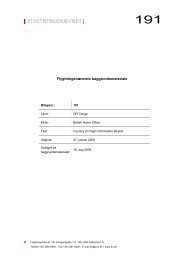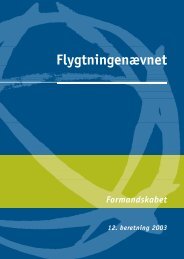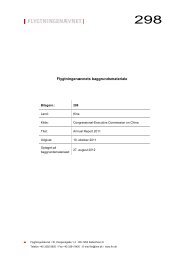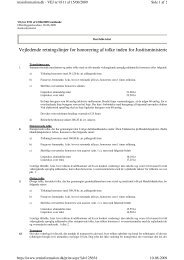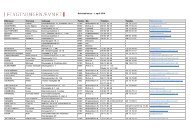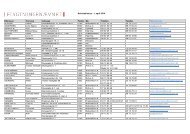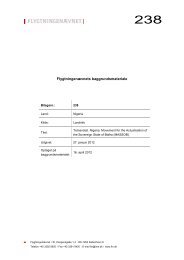Annual Report - National Human Rights Commission
Annual Report - National Human Rights Commission
Annual Report - National Human Rights Commission
Create successful ePaper yourself
Turn your PDF publications into a flip-book with our unique Google optimized e-Paper software.
<strong>Rights</strong> of the Vulnerable<br />
○ ○ ○ ○ ○ ○ ○ ○ ○ ○ ○ ○ ○ ○ ○ ○ ○ ○ ○ ○ ○ ○ ○ ○ ○ ○ ○ ○ ○ ○ ○ ○ ○ ○ ○ ○ ○ ○ ○ ○ ○ ○ ○ ○ ○ ○ ○ ○ ○ ○ ○ ○ ○ ○ ○ ○ ○ ○ ○ ○ ○<br />
○<br />
Dalit Cell and placed it under the charge of a Member of the <strong>Commission</strong>. The Chairperson,<br />
NHRC released Shri K.B. Saxena’s report on prevention of atrocities against Scheduled Castes<br />
on 12-10-2004. The Cell has co-ordinated the printing of the <strong>Report</strong> in English. It is also being<br />
printed in Hindi and other Indian languages. The <strong>Commission</strong> has sent its recommendations on<br />
ways and means to prevent atrocities against Scheduled Castes to various authorities, both to the<br />
Central and State Governments for taking necessary action (Annexure 11 (a) to (c)). In particular,<br />
States have been asked to:<br />
●<br />
●<br />
●<br />
●<br />
●<br />
●<br />
●<br />
●<br />
●<br />
Identify atrocity and untouchability prone areas and prepare a plan of action.<br />
Appointment of exclusive special courts where volume of atrocity cases is large and appoint<br />
competent and committed special public prosecutors.<br />
A 3-tier Training programme for police and civil functionaries.<br />
An annual workshop of District Magistrates and Superintendents of Police on<br />
implementation of laws in this regard.<br />
Women officers should be assigned to all atrocity prone areas, with cells established to<br />
entertain complaints;<br />
Self-help groups of Scheduled Caste women should be given elementary legal training<br />
along with sessions on confidence building;<br />
Identify a NGO in each district which can be approached in case of custodial violence or<br />
any other atrocity.<br />
Panchayats may be sensitized about the issues concerning the Scheduled Castes and various<br />
De-Notified Tribes.<br />
Institute annual awards for the police stations and districts, which emerge as the most<br />
responsive to the complaints of the Scheduled Castes.<br />
10.8 The <strong>Commission</strong> proposes to closely monitor the implementation of these recommendations<br />
in the coming years.<br />
10.9 The <strong>Commission</strong> also organized a two-day Sensitization Training Programme for senior<br />
police officers in the Northern Region on the prevention of atrocities against Scheduled Castes in<br />
New Delhi in the month of January 2005 in partnership with the Indian Social Institute. The<br />
workshop aimed at sensitizing the law enforcement personnel about the scale and intensity of<br />
atrocities on the Scheduled Castes and Scheduled Tribes communities in the country and the legal<br />
support available to them to carry out their role for the protection and promotion of human rights of<br />
the Dalit community. The programme was well received. The feedback received from the participants<br />
suggested that the <strong>Commission</strong> should organize similar programmes in other parts of the country.<br />
B] Manual Scavenging<br />
10.10 The NHRC has been vigorously pursuing the need to end the degrading practice of<br />
manual scavenging in the country. It has taken up this matter at the highest echelons of the<br />
<strong>National</strong> <strong>Human</strong> <strong>Rights</strong> <strong>Commission</strong> <strong>Annual</strong> <strong>Report</strong> - 2004-2005<br />
145<br />
AR-Chapter-1-19-10-6-06.p65<br />
165<br />
7/17/06, 6:30 PM



